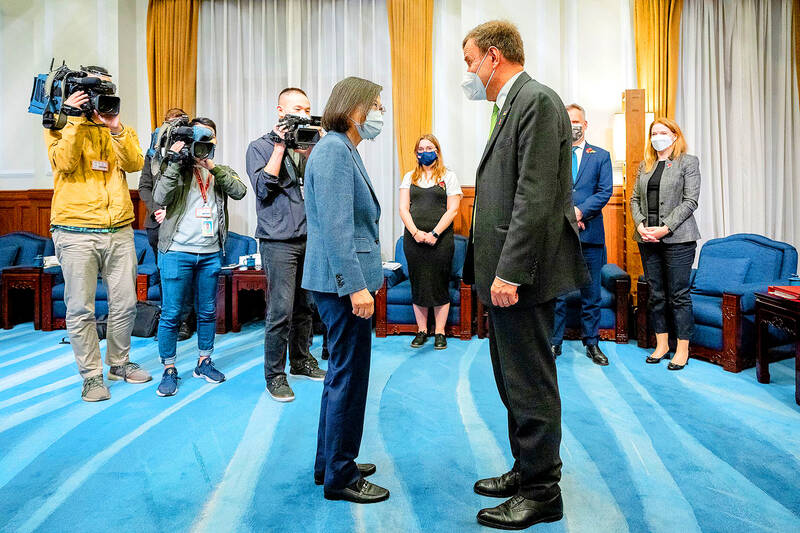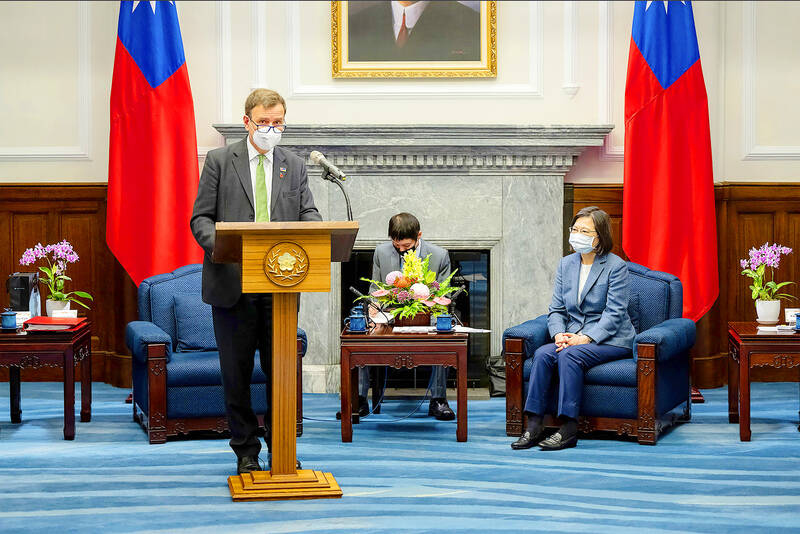President Tsai Ing-wen (蔡英文) on Wednesday thanked British Minister of State for Trade Policy Greg Hands for London’s support for Taiwan after he became the latest foreign official to defy Chinese pressure and visit the nation.
Tsai expressed hope for “new heights” in Taiwanese-British relations and “joint achievements” as the Chinese Communist Party steps up efforts to intimidate Taiwan.
“Let me take this opportunity to thank the government of the United Kingdom for its long-standing support of Taiwan’s international participation, and for advocating for peace and stability across the Taiwan Strait,” Tsai said.

Photo: Taiwan Presidential Office / AFP
For its part, Britain is looking to develop new trade partnerships since leaving the EU in 2020. Hands became the first British official to visit Taiwan since the start of the COVID-19 pandemic that year.
Britain wants closer cooperation with Taiwan in semiconductors, wind energy and education, Hands told the Central News Agency.
Taiwanese firms manufacture most of the world’s high-end processor chips, while Britain is home to ARM, a leading chip designer.

Photo: Taiwan Presidential Office / AP
“Our relationship reaches beyond trade and investment as two groups of islands with strong democracies and institutions,” Hands said. “We have much in common and face many challenges as like-minded partners.”
Britain and China are to take part in next week’s meeting of the G20 major economies in Indonesia.
Taiwan and China are to attend an APEC meeting this month in Bangkok, where Taiwan is to be represented by Taiwan Semiconductor Manufacturing Co (台積電) founder Morris Chang (張忠謀).
Other foreign officials, including US House of Representatives Speaker Nancy Pelosi, have visited Taiwan to show support for its government in the face of threats by Beijing to seize the nation by force.
On Monday, the Chinese Ministry of Foreign Affairs demanded that Britain stop official contacts with Taiwan.
China has imposed visa bans and other sanctions on foreign officials and governments that extend contacts to Taiwan.
Tsai expressed interest in signing an investment deal with the UK to promote mutual trade and investment.
In a meeting in January last year, Tsai told British Representative to Taiwan John Dennis that she “very much look[s] forward to Taiwan and the UK being able to commence dialogue on a free-trade or bilateral investment agreement.”
At the meeting with Hands, Tsai said that Taiwan and the UK had deepened partnerships in areas such as technology, energy, business and trade over the past few years.
In the face of many challenges in the post-pandemic era, Taiwan looks forward to working with the UK and other democratic states to build more resilient global supply chains through technological cooperation and mutual investments, as well as financial support, she said.
Hands said that the UK would continue to be in talks with Taiwan’s authorities to help it achieve its “Bilingual 2030” policy.
The Tsai administration introduced the policy in 2017.

LONG FLIGHT: The jets would be flown by US pilots, with Taiwanese copilots in the two-seat F-16D variant to help familiarize them with the aircraft, the source said The US is expected to fly 10 Lockheed Martin F-16C/D Block 70/72 jets to Taiwan over the coming months to fulfill a long-awaited order of 66 aircraft, a defense official said yesterday. Word that the first batch of the jets would be delivered soon was welcome news to Taiwan, which has become concerned about delays in the delivery of US arms amid rising military tensions with China. Speaking on condition of anonymity, the official said the initial tranche of the nation’s F-16s are rolling off assembly lines in the US and would be flown under their own power to Taiwan by way

OBJECTS AT SEA: Satellites with synthetic-aperture radar could aid in the detection of small Chinese boats attempting to illegally enter Taiwan, the space agency head said Taiwan aims to send the nation’s first low Earth orbit (LEO) satellite into space in 2027, while the first Formosat-8 and Formosat-9 spacecraft are to be launched in October and 2028 respectively, the National Science and Technology Council said yesterday. The council laid out its space development plan in a report reviewed by members of the legislature’s Education and Culture Committee. Six LEO satellites would be produced in the initial phase, with the first one, the B5G-1A, scheduled to be launched in 2027, the council said in the report. Regarding the second satellite, the B5G-1B, the government plans to work with private contractors

‘NARWHAL’: The indigenous submarine completed its harbor acceptance test recently and is now under heavy guard as it undergoes tests in open waters, a source said The Hai Kun (海鯤), the nation’s first indigenous defense submarine, yesterday began sea trials, sailing out of the Port of Kaohsiung, a military source said. Also known as the “Narwhal,” the vessel departed from CSBC Corp, Taiwan’s (台灣國際造船) shipyard at about 8am, where it had been docked. More than 10 technicians and military personnel were on deck, with several others standing atop the sail. After recently completing its harbor acceptance test, the vessel has started a series of sea-based trials, including tests of its propulsion and navigational systems, while partially surfaced, the source said. The Hai Kun underwent tests in the port from

New Taipei City prosecutors yesterday indicted nine entertainers over their alleged connection to a fraud ring that produces falsified documents to help people evade military service, including actor Darren Wang (王大陸) and show host William Liao (廖威廉). Twenty-eight people were charged with contravening the Punishment for Violation of Military Service System Act (妨害兵役治罪條例) and Article 214 of the Criminal Code for “causing a public official to make a false entry in a public document.” Prosecutors alleged the fraud ring was ran by a man, Chen Chih-ming (陳志明), and his three assistants, and that they were paid to help people dodge compulsory